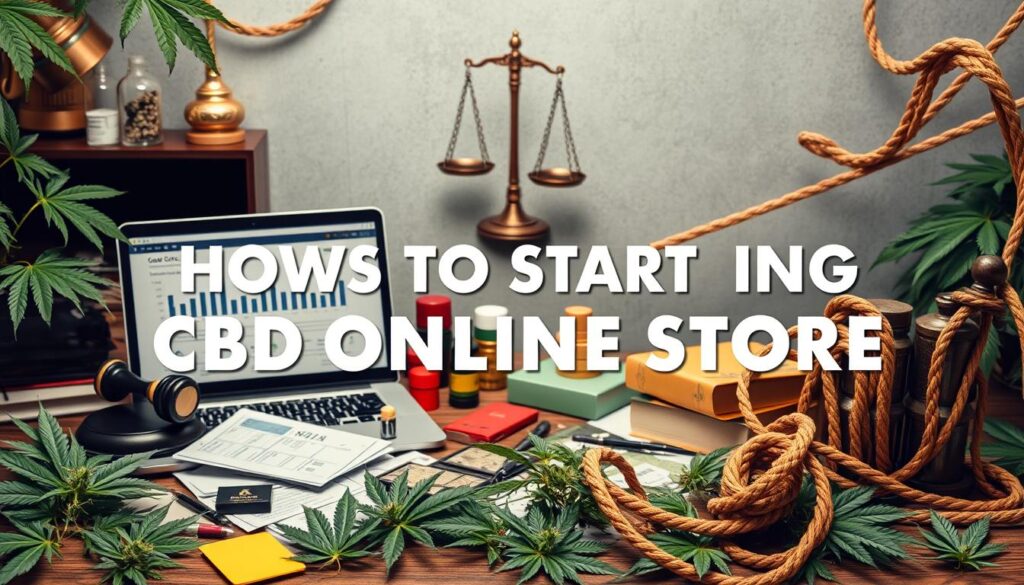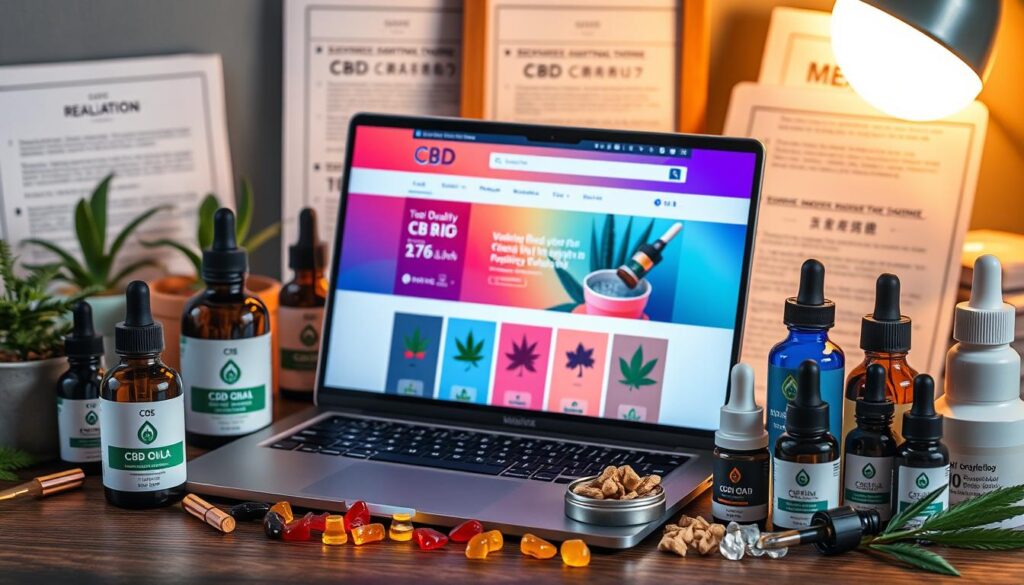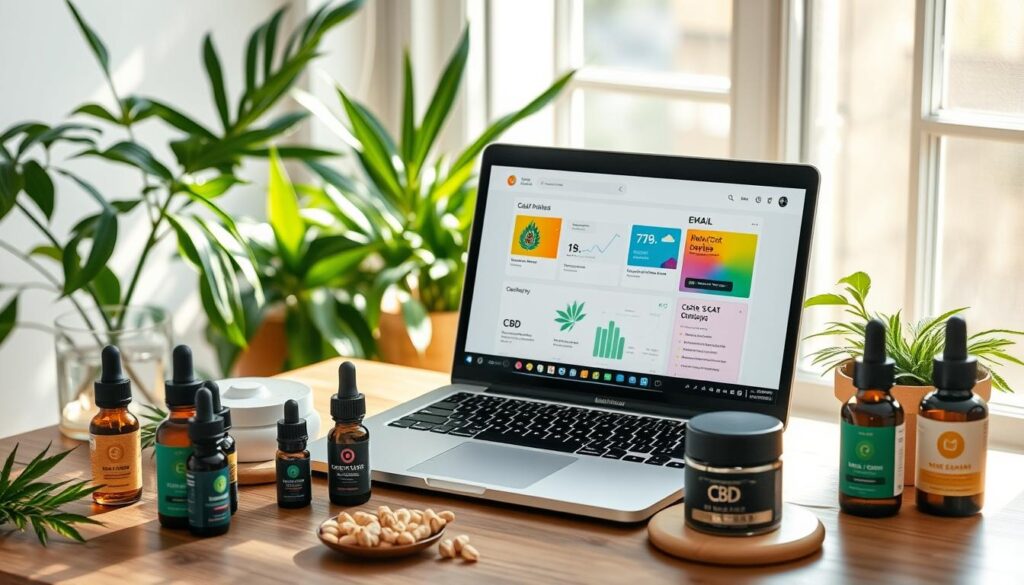In the fast-changing CBD market, how can new businesses avoid common mistakes? These include CBD entrepreneurship errors and missing out on key opportunities. Knowing these areas and how to use your strengths can make all the difference.
Did you know 60% of new CBD businesses don’t know their target market well? This lack of understanding can hurt their marketing and sales. Using what you already have, like email lists, can boost marketing by up to 70%.
It’s also key to have a clear Unique Selling Proposition (USP). A strong USP can increase brand recognition by 40% in the competitive CBD market. It’s about showing what makes your product unique and making it sound appealing. Using both organic and paid media can also increase visibility by 50%, leading to more sales.
Making these mistakes is a common CBD startup blunder. But, by focusing on these key areas, we can not only avoid these errors but also succeed in the CBD business online.
Misunderstanding Regulatory and Compliance Issues
The CBD industry is growing fast and is very popular. The U.S. cannabis market is expected to hit $40 billion by 2024. But, many new businesses don’t understand the rules, which can be a big problem.
Not Staying Updated with Regulations
One big mistake is not keeping up with CBD laws. The 2018 U.S. Farm Bill changed the rules for hemp. It allows the sale of hemp products with less than 0.3% THC. But, laws can change, so it’s important to stay informed.
Improper Labeling of CBD Products
Many businesses also struggle with labeling. They might print labels without checking if the rules have changed. Labels need to show how much CBD is in each product. If they don’t, products can’t be sold legally.
Failing to Verify Product Ingredients and Sources
It’s also important to check where ingredients come from. If products have more than 0.3% THC, they’re illegal. Checking vendors is key to avoiding legal trouble.
In short, following the rules is crucial for CBD businesses. Ignoring labeling, ingredients, and updates can cause big problems. It’s better to be safe than sorry.
Failing to Identify and Understand Your Target Market
Starting a new CBD business often means not knowing who to sell to. It’s key to know your CBD target market well. This means studying CBD customer demographics to make a good marketing plan. Sadly, many new businesses skip this important step.
Ignoring the Importance of Customer Personas
Creating customer personas is crucial for CBD target market identification. These personas give insights into what people like and need. About 60% of CBD users take it for pain, while others use it for mood issues or seizures.
Not knowing this can make your marketing not hit the mark. This can turn people off and lose potential customers.
Assuming a General Audience
Thinking your product will appeal to everyone is a big mistake. The CBD market is growing fast, but only if you target the right people. Good segmentation helps avoid CBD marketing mishaps by focusing on specific needs like pain relief or mental health.
Using influencers can help reach certain groups and build trust. But, not focusing on specific markets can make your marketing weak. This can be why so many online stores fail early on.
Here’s a quick look at what works versus what doesn’t in CBD marketing mishaps:
| Ideal Marketing Practices | Common Marketing Mishaps |
|---|---|
| Creating detailed customer personas | Ignoring personalized consumer data |
| Targeting niche markets based on demographics | Assuming a general audience fit |
| Using influencers effectively | Overlooking specific community engagement |
| Personalizing online shopping experiences | Using generic marketing messages |
Knowing your target market is key to a successful CBD business. Doing it right can make your marketing better and avoid common mistakes. It ensures your efforts are well spent.
Not Leveraging Existing Assets for Marketing
In the fast-paced world of CBD marketing, many brands miss out on using their CBD marketing assets fully. With the CBD oil market expected to hit over $20 billion by 2024, using every resource is key. This includes mining customer data, which is vital for a successful CBD brand content strategy.
For example, millennials spend a lot of time on Facebook, YouTube, and Instagram. These are great places for targeted ads. Our data shows that about 40 percent of users buy something after seeing it on these platforms. Using CBD brand content strategy across different channels can really pay off. By using data, we can reach the right people in the best way.
Here are some strategies:
- Use data mining to find out who our customers are, what they like, and how they behave.
- Make the most of what we already have by reusing content. This saves time and money.
- Target specific areas using Every Door Direct Mail (EDDM) to cut down on costs.
Also, we can make more use of our assets through affiliate marketing. The global affiliate marketing industry is worth over $12 billion, making up 15 percent of total media revenue. This fits perfectly with our CBD brand content strategy, helping us reach more people and get better returns.
In short, if we don’t use these CBD marketing assets, we miss out on connecting with our audience and growing our product’s reach. As the market grows, using these strategies will be essential to stay ahead.
Common CBD Business Mistakes: Operational and Logistical Errors
Many CBD retailers miss key operational and logistical steps. This leads to big problems. It’s vital to get vendor and supplier agreements right, manage inventory well, and plan the supply chain.
Improper Vendor and Supplier Agreements
Creating solid CBD supplier contracts is key to avoid trouble. It’s important to check vendors’ backgrounds, safety records, and how they make products. A good contract protects you.
But, many buyers don’t check suppliers well. This can lead to problems with unreliable or illegal partners. Also, not all suppliers are open about their licenses and certifications. This raises big questions about their legality and reliability.
In a study of 102 CBD products, 18% contained less than 80% of the labeled CBD amount, and 45% contained CBD within 20% of the labeled amount, highlighting mislabeling issues.
Ineffective Management of Inventory and Supply Chain
Bad inventory and supply chain management can hurt your business. It can make customers unhappy. Many buyers face issues with getting products on time or in the right amount.
To fix this, you need strong CBD inventory management. This means regular checks, tracking, and being ready to change with the market. Also, following federal rules and checking product sources is important for your business and customers.
Some CBD products have THC, which is risky. Keeping product quality high and labels accurate is crucial. Good inventory and supply chain management help you stay on top of changes and keep operations smooth.
For more help on improving your CBD business, look into services from experts like Epic CBD Marketing.
| Issue | Statistic |
|---|---|
| Buyers failing to research suppliers | 86% |
| Suppliers lacking licenses and certifications | 63% |
| Inconsistent product availability | 68% |
| Products containing THC | 49% |
| Mislabeled products | 62% |
Overlooking the Power of Multi-Channel Marketing
In today’s digital world, a strong multi-channel marketing in CBD strategy is key. Many CBD companies fail to use social media well. This limits their brand’s reach and how much people interact with it.
Almost 90% of people want a seamless shopping experience across all channels. And about 73% of shoppers buy something in-store after seeing it online. So, having a solid CBD social media strategy is crucial.
Failing to Utilize Social Media Effectively
Social media is vital for driving traffic and building brand awareness. It’s also great for engaging with your audience.
Research shows 66% of Gen Z shoppers check social media before buying. This means creating content that speaks to your audience is essential. It helps grow a loyal community and stand out in a crowded market.
Ignoring Community Engagement Platforms
Not using other engagement platforms like forums and groups can slow growth. Good CBD community engagement involves using these platforms to build loyal customers.
Being active in online discussions about CBD products increases visibility and trust. For example, Reddit and wellness forums are great for connecting with your audience.
By taking a full approach to multi-channel marketing in CBD, businesses can improve their reach and engagement. This leads to more effective marketing and greater success.
Neglecting Financial Health and Capital Management
CBD financial planning and effective capital management are key to success. Financial mistakes, like underestimating costs for compliance and marketing, can slow growth. For instance, regulatory compliance costs a lot, often overlooked by new businesses.
Insurance for CBD businesses is complex due to state and federal laws. It’s important to work with experienced brokers or lawyers. They help understand coverage, policy limits, and extra policies needed. This knowledge prevents unexpected costs and keeps operations smooth.
Getting professional advice is crucial. Financial and legal experts help with financial planning and business strategy. By doing thorough research, choosing the right insurance, and tracking finances closely, CBD businesses can avoid financial traps. This leads to steady growth and a strong business foundation.
FAQ
What are common mistakes new CBD businesses make?
Why is staying updated with regulations critical for CBD businesses?
What are common compliance issues in the CBD industry?
How can CBD businesses avoid missteps with product labeling?
What role does customer persona play in a CBD business’s success?
Why is it a mistake to assume a general audience for CBD products?
How can CBD businesses better leverage existing marketing assets?
Why are vendor and supplier agreements important for CBD retailers?
What operational mistakes should CBD businesses avoid?
How crucial is multi-channel marketing for CBD businesses?
Why do CBD businesses need thorough financial planning?
Source Links
- https://www.linkedin.com/pulse/10-common-mistakes-companies-make-when-marketing-cbd-products-eder
- https://cbdlocalseo.com/blogs/seo-blog/12-gaps-on-cbd-business-setup-and-the-ways-to-avoid-them
- https://www.mcglinchey.com/insights/cbd-the-workplace-a-word-to-the-wise/
- https://jencapgroup.com/insights/cannabis/blunt-truth-8-cannabis-insurance-mistakes-dispensaries-should-avoid/
- https://compliancearchitects.com/cbd-manufacturers-must-develop-gmps/
- https://www.wiredmessenger.com/blogs/cbd-marketing-101-an-insider-scoop
- https://joyorganics.com/blogs/news/cbd-marketing-101
- https://alchemyleads.com/cbd-marketing-for-cannabis-brands/
- https://www.growmail.com/blog/cannabis-and-cbd-marketing-facts-to-keep-in-mind/
- https://www.klgates.com/In_the_Weeds_Eight_Considerations_for_Retailers_that_Wish_to_Sell_CBD_Products
- https://solink.com/resources/industry-insights/threats-to-the-cannabis-industry/
- https://wholesale.sweetsensiwellness.com/mistakes-to-avoid-when-buying-cbd-in-bulk-for-wholesale/
- https://pmc.ncbi.nlm.nih.gov/articles/PMC7723146/
- https://www.bigcommerce.com/articles/omnichannel-retail/
- https://bbbprograms.org/programs/all-programs/dssrc/ccd/case-22-2020-competitor-challenge-bioreigns
- https://www.terrayn.com/dispensary-marketing-ideas-for-business-growth/
- https://www.lightspeedhq.com/blog/why-small-businesses-fail/
- https://www.bu.edu/bulawreview/files/2021/07/HILL.pdf






